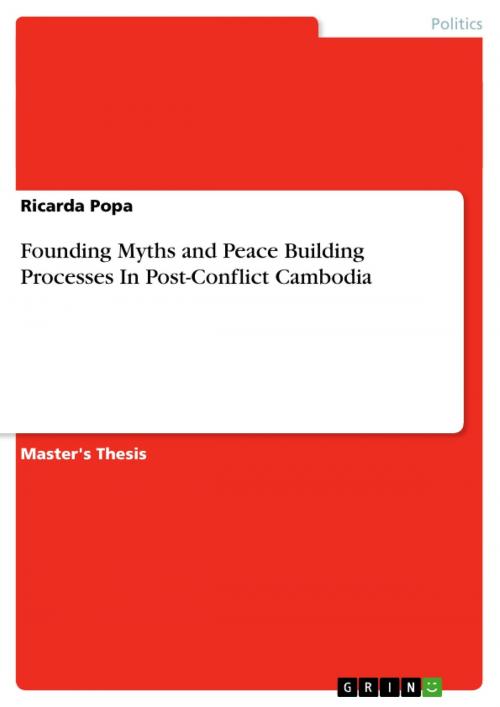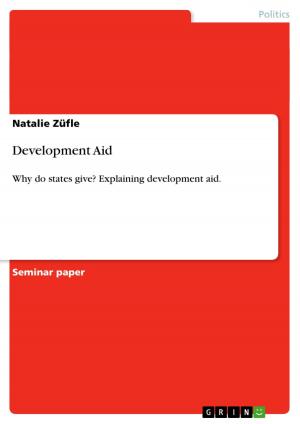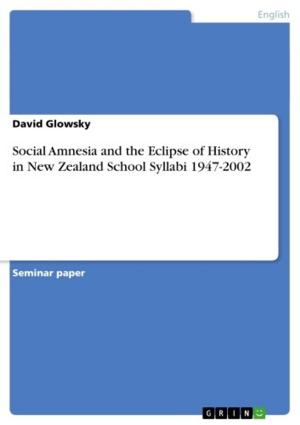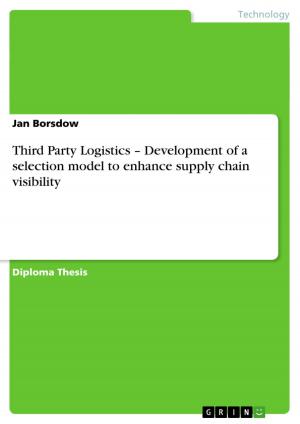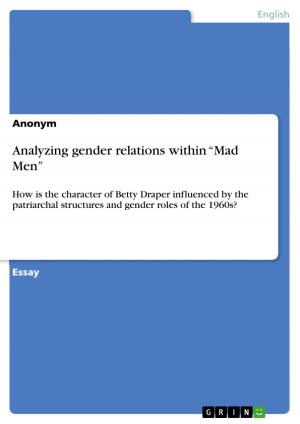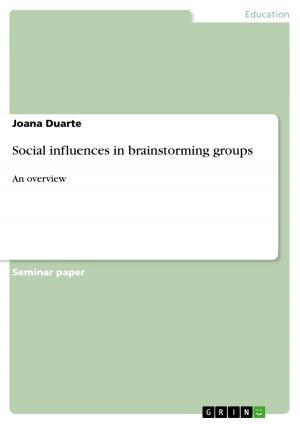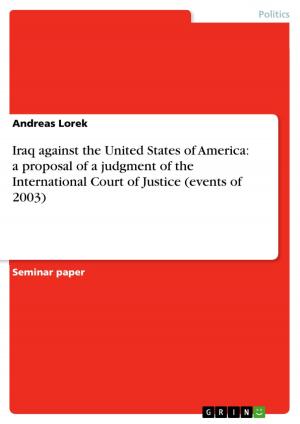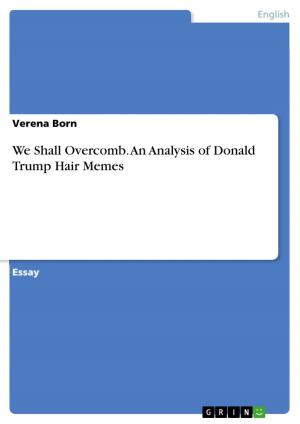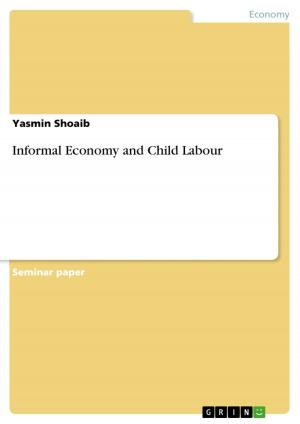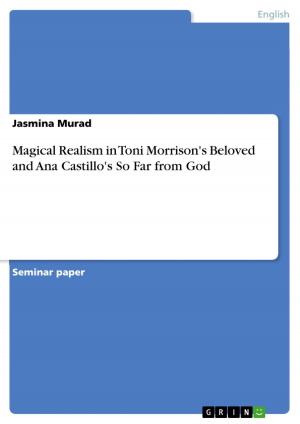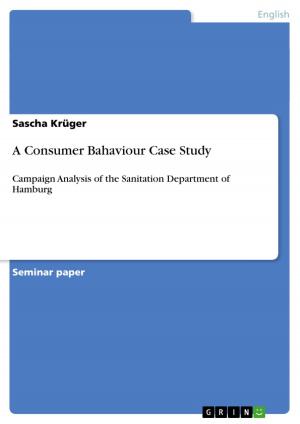Founding Myths and Peace Building Processes In Post-Conflict Cambodia
Nonfiction, Social & Cultural Studies, Political Science, International, International Relations| Author: | Ricarda Popa | ISBN: | 9783640543038 |
| Publisher: | GRIN Publishing | Publication: | February 19, 2010 |
| Imprint: | GRIN Publishing | Language: | English |
| Author: | Ricarda Popa |
| ISBN: | 9783640543038 |
| Publisher: | GRIN Publishing |
| Publication: | February 19, 2010 |
| Imprint: | GRIN Publishing |
| Language: | English |
Master's Thesis from the year 2009 in the subject Politics - International Politics - Region: Far East, grade: 14 points, University of Marburg (Gesellschaftswissenschaften und Philosophie), language: English, abstract: Cambodia has accumulated hundreds of years of repressions, supervision by foreign countries, territorial partitions, insecurities, and conflicts. The last 5 decades, Cambodia has suffered extensive military or ideological wars, undergoing changing political regimes that were neither stable nor legitimately recognized. These passed from absolute monarchy, to communism attached to Maoism, to socialism after Marx and Lenin, to capitalism, and finally to constitutional monarchy based on parliamentary system, (Vannath 2003:49) which have influenced significantly all state institutions from complete destruction to reconstruction based on ideological, geo-strategic interest or political cupidity. Ironically, the country's experience has remained internationally rather unnoticed, succeeding eventually in the past years to acquire political attention due to the substantial international financial and technical efforts in post-war reconstruction and peace building. (Heijmans 2004:331). With this support, Cambodia is trying to redefine itself and to open itself to the world as a regional equilibrating partner, a corner of cultural and architectural treasures, but also as a traumatized nation in need of foreign aid. In this process, the country has formulated diverse narratives to represent it on the international and domestic scene and to help people go on with a hope for peace and prosperity. Given being this evolution, the thesis ascertains the contribution of the new Cambodian founding myths in the country's peace building after having emerged from destabilizing rules, especially the Khmer Rouge regime. In the wake of democratization, Cambodia has started to set a new beginning, this paper searching to understand if these transitional definitions of the nation play a constructive part in the promotion of sustainable peace and security. The issue is still in the process of becoming, since only the end of the Vietnamese administration in September 1989 has opened the way for Cambodia to make justice and recover from the pernicious times. For this reason the victim narratives still claim justice, turning into full founding myths when they would have lost there appellative function. (Münkler 2008:2) Consequently, Cambodia slightly adopted some measures to improve its situation, among which the formulation of new narratives representing the nation's position in dealing with its trauma in the face of the new international support and its own reckoning with its past.
Master's Thesis from the year 2009 in the subject Politics - International Politics - Region: Far East, grade: 14 points, University of Marburg (Gesellschaftswissenschaften und Philosophie), language: English, abstract: Cambodia has accumulated hundreds of years of repressions, supervision by foreign countries, territorial partitions, insecurities, and conflicts. The last 5 decades, Cambodia has suffered extensive military or ideological wars, undergoing changing political regimes that were neither stable nor legitimately recognized. These passed from absolute monarchy, to communism attached to Maoism, to socialism after Marx and Lenin, to capitalism, and finally to constitutional monarchy based on parliamentary system, (Vannath 2003:49) which have influenced significantly all state institutions from complete destruction to reconstruction based on ideological, geo-strategic interest or political cupidity. Ironically, the country's experience has remained internationally rather unnoticed, succeeding eventually in the past years to acquire political attention due to the substantial international financial and technical efforts in post-war reconstruction and peace building. (Heijmans 2004:331). With this support, Cambodia is trying to redefine itself and to open itself to the world as a regional equilibrating partner, a corner of cultural and architectural treasures, but also as a traumatized nation in need of foreign aid. In this process, the country has formulated diverse narratives to represent it on the international and domestic scene and to help people go on with a hope for peace and prosperity. Given being this evolution, the thesis ascertains the contribution of the new Cambodian founding myths in the country's peace building after having emerged from destabilizing rules, especially the Khmer Rouge regime. In the wake of democratization, Cambodia has started to set a new beginning, this paper searching to understand if these transitional definitions of the nation play a constructive part in the promotion of sustainable peace and security. The issue is still in the process of becoming, since only the end of the Vietnamese administration in September 1989 has opened the way for Cambodia to make justice and recover from the pernicious times. For this reason the victim narratives still claim justice, turning into full founding myths when they would have lost there appellative function. (Münkler 2008:2) Consequently, Cambodia slightly adopted some measures to improve its situation, among which the formulation of new narratives representing the nation's position in dealing with its trauma in the face of the new international support and its own reckoning with its past.
